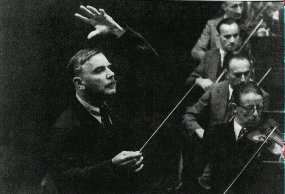This is a unique and felicitous coupling performed with panache and nicely
recorded in non-gimmicky sound. The works are late romantic and impressionistic
in style. They are consistent with the natural style of the French horn.
The Schoeck Horn Concerto is a personal favourite of mine. I first discovered
it on an ancient Mace LP in the very early 1980s. The work should long ago
have been selected by an enterprising competitor in the Young Musician of
the Year Competition. It makes a fresh air change from the Mozart and Strauss
concertos. The work breathes a woodland romance and lightness of spirit.
There is succulent playing from soloist and the orchestra. Schoeck's audio-visual
mastery is apparent from the moonlit Sommernacht (another Schoeck
work you really should hear) evocation in the second movement. Schoeck's
lunar light string tone lulls us into sleep on Alpine haystack in high summer.
The last movement is Mozartian and ends with a cheeky nod and a wink.
The Koechlin work is enigmatic. It opens with calls like those at the start
of the Rossini William Tell overture rather like yodelling. The scene is
one of serenity and is very well done in this recording. The work is much
more impressionistic than the Schoeck. The atmosphere is too unvaried to
make the work entirely successful but it is intriguing. Remarkable are the
Mother Goose moments, the song of a Christmas hymn and music redolent of
the high hills.
The Smyth (written a year before the Koechlin) opens with a grand Brahmsian
curtains-up. It is a double concerto and the contrast in sound is strong
with the vibrancy of the solo violin taking the female role contrasting with
the masculine lines of the bluffer though inclined to reflection horn. The
dialogue might even suggest that the composer saw herself as the male and
some un-named lover as the female. The movement has a jogtrot pacing and
charming 'chip-chip' with violin playfully echoed by horn and vice versa.
The movement ends in a Viennese urbane cosmopolitan manner. The second movement
has a leaning towards a more modern style. The finale is lively.
The recordings were made by Nord-Deutsches Rundfunk, Hannover in November
1995.
You may well do better in the Schoeck by going for the
CPO recording. I do not know the Zuk performance
of the Koechlin Poeme but in any event it is quite a rare work. As for the
Smyth the preferred version is the one on Chandos but these are matters of
fine preference. No-one is going to feel that the works are misrepresented
by these recordings. They are executed with perception by artists who clearly
care about the composer's message and are able to communicate to their audience.
 Outstandingly
good notes in German and English enhanced by fine photos of the three composers
and the soloists. The photo of Schoeck conducting was new to me and well
worth seeing. The documentation for this recording deserves an award.
Outstandingly
good notes in German and English enhanced by fine photos of the three composers
and the soloists. The photo of Schoeck conducting was new to me and well
worth seeing. The documentation for this recording deserves an award.
A recommended collection for which this coupling has no competition. It would
have rated an even firmer recommendation if the coupling had been more generous
in timing - room for another concerto.
Reviewer
Rob Barnett


